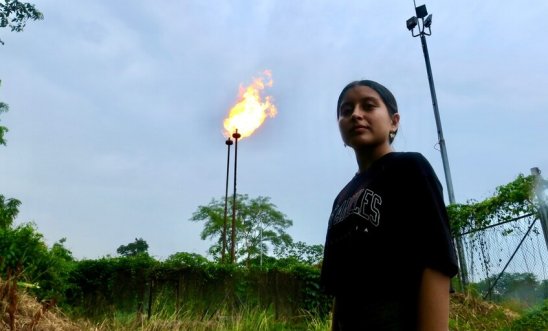
Press releases
Ecuador: Gas flaring is endangering the Amazon and the future of the planet - New Report

Despite court ruling, Ecuadorian government continues to allow dangerous flaring as it seeks to maintain oil production
Ecuadorian Amazon has become an ‘oil sacrifice zone’ with marginalised communities severely affected
‘Ecuador must put an end to the burning of gas flares - it endangers the Amazon, the world and the future of the children who will inherit the planet’ - Ana Piquer
The Ecuadorian government must immediately halt the dangerous practice of gas flaring in the Amazon rainforest to protect both marginalised communities and the wider planetary ecosystem, said Amnesty International in a new report today.
The report, ‘The Amazon is burning, the future is burning!’ Young activists defending the Ecuadorian Amazon from gas flares that threaten rights now and in the future”, reveals how the Ecuadorian government is continuing to allow gas flaring in the Amazon despite a court ruling which has specified that it should be stopped.
In a 2021 court ruling following a legal case brought by “Warriors for the Amazon”, a group of nine girls and young women climate activists from communities in Sucumbíos and Orellana,
both the state-owned company and private companies in Ecuador were told they must move toward eliminating dangerous gas flaring, prioritising the removal of those located near population centres. Both state-owned and private companies use flaring to reduce costs in socially and environmentally vulnerable areas known as “sacrifice zones”, where marginalisation and poverty are compounded by the environmental degradation caused by oil extraction.
However, according to testimonies gathered by Amnesty as well as documents, and other information verified for Amnesty’s report, evidence points to the Ecuadorian government and its institutions seeking to maintain oil production at all costs, avoiding any real steps to remove the flares or to create the conditions necessary for a rapid and fair energy transition.
Amnesty’s research also reveals that at least 52 flares are within three miles of population centres, meaning they are potentially harmful to local communities as well as the environment.
Ana Piquer, Amnesty International’s Americas Director, said:
“The Ecuadorian authorities have an obligation to act decisively and promptly to urgently implement the ruling in the gas flares case. Complying with this ruling is an act of climate, environmental and racial justice.
“Oil ‘wealth’ has never reached the Ecuadorian Amazon; rather, the region is a large oil sacrifice zone where children - including the girls and young women in the gas flares case - are one of the most vulnerable population groups.
“Ecuador must put an end to the burning of gas in flares - it endangers the Amazon, the world and the future of the children who will inherit the planet.
“By eliminating gas flares and committing to a transition to a fossil fuel-free economy, Ecuador can become a standard bearer for climate and environmental justice.”
Gas flaring: a danger to the planet
The negative impacts of gas flaring on human rights and the environment - and its contribution to global warming - are now widely recognised by the international and the scientific communities. There are global initiatives in place to phase out flaring, with some countries having already banned or regulated the practice. However, across the Americas - including in Ecuador, the United States, Mexico, Argentina, Brazil and Venezuela - gas flaring is still routine during oil extraction.
According to the World Bank, Ecuador is one of the top 30 gas flaring countries in the world. By maintaining and protecting flaring rather than implementing existing alternatives to replace the practice, the Ecuadorian authorities are both failing to comply with the 2021 court ruling and is also neglecting their international obligations to reduce dangerous greenhouse gas emissions.
For the past half-century, Ecuador's economy has been heavily based on oil extraction and as such the country has an important responsibility and opportunity to reduce emissions from the sector - paving the way for a rapid and just energy transition that avoids further damage to the global climate system. As the effects from greenhouse gas emissions is cumulative, Ecuador's failure to address gas flaring is a violation of its duty to mitigate and protect human rights in the context of climate change and puts the future of humanity at significant risk.